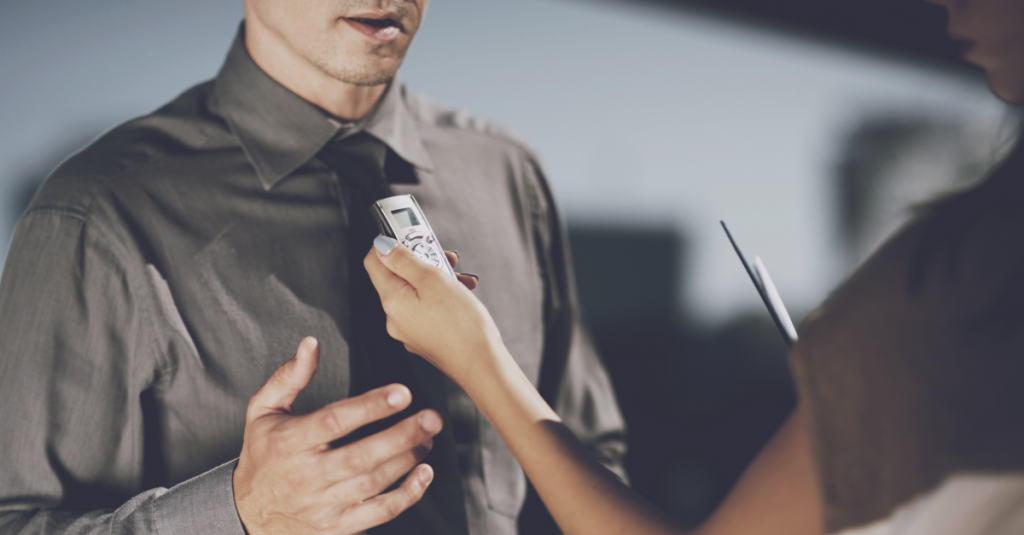Talking to the press can be terrifying for some people. However, if you are a businessman or top manager of a company, it may happen that, within your duties, you are called to give interviews.
While in written interviews we are able to respond formally and without major lapses, when we speak directly to a journalist – being it a recorded interview for later publication in the press, television or radio, or even live – it is important to have an articulate, objective speech and convey the message as transparently as possible.
However, it is not always easy to talk to journalists. Stress can overtake us, we choke, we forget the question that was asked and, many times, we also get lost when we want to say everything at once and, at the end we no longer know what we are responding to.
Has this happened to you? Certainly, it wasn’t a good feeling and you might have been left with the idea that you could have done much better in a certain interview, or given that certain information that was left out.
This way, we leave you with six pieces of advice that will help you not crack when you have to talk to journalists:
1. Prepare the interview carefully
It is important to prepare yourself well for the interview and collect as much information as possible beforehand, namely:
- The media in which the interview will be published;
- The journalist who is going to interview you – and here it is important to do a research on the topics that the journalist usually writes about, in order to better understand who is in front of you;
- The main topic of the interview;
- Key points – based on the topic of the interview, write down the most important points you want to focus on when responding. There are rare cases in which journalists tell you the questions beforehand, but if you know the topic that will be addressed and compile all the information you have on that topic it will be easier to answer assertively when you are face to face with the journalist;
- Publication date – whenever possible, try to know when the interview will be published. This can be important because if you have information that you can only disclose after a certain date, you can decide to disclose it or not based on the expected date of publication.
2. Rehearse your answers
Repeating and training responses are an excellent way to train your speech so that, while talking to journalists, everything goes smoothly. You may not even have the questions before the interview, but, knowing in advance the topic that will be discussed, you can rehearse some questions and, from there, train your answers. You will see that the result will be worth it.
3. Empathize with the journalist
You don’t have to – nor should you! – be the journalist’s best friend. However, a good way to break the ice is to try, before starting the interview, to talk informally with the person who is going to interview you. This way, you will certainly be able to create some empathy and this will help you relax when you are answering questions. Don’t forget: the journalist is not a bogeyman, he simply has a huge hunger for answers.
4. Take notes during the interview
Now that you have your briefing and responses ready, it’s time to ensure that nothing fails during the interview. You can take advantage of printing, or have your notes and data on your smartphone, but it is important to pay close attention to what the journalist says. Always carry a pen and paper with you and take notes while the journalist is working on the question, so there will certainly be nothing left to say and you will answer to what is needed, point by point.
5. Be objective while answering
There is a tendency to give a long answer when asked a question orally. Nothing could be more wrong. Of course, it is important to give some context about what you are going to say, but when it comes to answering, do it objectively and clearly. or you risk that the journalist repeats the question over and over again until he gets the answer you should have given initially.
6. Media training
If, after following these five pieces of advice, you feel that you are still not comfortable giving face-to-face or videoconferencing interviews, media training can definitely help you overcome your fears. Media training consists of training that helps professionals from all sectors to become the best spokespeople for your company in case you have to speak to journalists, or even speak in public. Here, it will be possible to simulate video interviews and, through their visualization, better understand your body language, crutch words, and other barriers to your communication. Media training will also help you to outline your company’s key messages and get your message out with the clarity that is expected of a spokesperson.
Ready to face the press? The road may not be easy, but we are here to help you. Contact us to find out more!
Rita Justo, press officer at Media em Movimento

